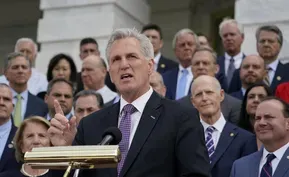
Western states agree to cut Colorado River water usage
Clip: 5/22/2023 | 5m 11sVideo has Closed Captions
What the Colorado River water use agreement will mean for western states
The Biden administration reached a landmark deal with several western states to stave off an immediate crisis with the Colorado River and the communities that are dependent on it. Under the agreement, California, Arizona and Nevada will take less water from the drought-stricken river in exchange for federal funding for cities, tribes and water districts. William Brangham reports.
Problems with Closed Captions? Closed Captioning Feedback
Problems with Closed Captions? Closed Captioning Feedback
Major corporate funding for the PBS News Hour is provided by BDO, BNSF, Consumer Cellular, American Cruise Lines, and Raymond James. Funding for the PBS NewsHour Weekend is provided by...

Western states agree to cut Colorado River water usage
Clip: 5/22/2023 | 5m 11sVideo has Closed Captions
The Biden administration reached a landmark deal with several western states to stave off an immediate crisis with the Colorado River and the communities that are dependent on it. Under the agreement, California, Arizona and Nevada will take less water from the drought-stricken river in exchange for federal funding for cities, tribes and water districts. William Brangham reports.
Problems with Closed Captions? Closed Captioning Feedback
How to Watch PBS News Hour
PBS News Hour is available to stream on pbs.org and the free PBS App, available on iPhone, Apple TV, Android TV, Android smartphones, Amazon Fire TV, Amazon Fire Tablet, Roku, Samsung Smart TV, and Vizio.
Providing Support for PBS.org
Learn Moreabout PBS online sponsorshipGEOFF BENNETT: The Biden administration has reached a landmark water deal with several Western states to stave off an immediate crisis with the Colorado River and the communities that depend on it.
William Brangham has a look at what's at stake.
WILLIAM BRANGHAM: Geoff, the Colorado River has been profoundly affected by a historic megadrought.
That's meant that Lake Powell and Lake Mead, the huge reservoirs fed by the river, could drop so low, it could endanger water supplies for agriculture, as well as for cities like Los Angeles and Phoenix.
This new deal puts those risks on hold for now.
California, Arizona and Nevada will agree to take less water from the river.
In exchange, the federal government will pay a billion dollars to key players in those states.
To help us understand what this all will mean, we're joined by Luke Runyon of KUNC Public Radio in Colorado.
He also hosts the podcast called "Thirst Gap."
Luke, thank you so much for being here.
Could you just tell us a little bit, what are the contours of this deal?
What did these states agree to?
LUKE RUNYON, KUNC Public Radio: These states essentially agreed to take less water from the Colorado River.
So we're looking at California, Arizona and Nevada.
They have agreed to significant cutbacks to their use over the next three years.
And, really, this is an attempt and to kind of live within a shrinking river.
Climate change has been ravaging the Colorado River for more than 20 years now.
It's a significantly smaller river.
And what we found is that we need to use a lot less water in order to match the declining supply that we have in this -- in the Southwest.
WILLIAM BRANGHAM: And do we know who those cuts that they have now agreed to are going to fall on?
Like, who is this going to sting?
LUKE RUNYON: Some of the cuts are going to hit agriculture.
And agriculture is the single largest use of the river's water in the Southwest.
A lot of that comes in the form of the sprawling agricultural areas in Southern California around Yuma, Arizona.
And those farmers have been insulated from some from some of these cuts over the last several years.
That's maybe not going to be the case anymore because they're going to be getting payments from the federal government in order to use less.
WILLIAM BRANGHAM: I know that the federal government had earlier asked these states and others to come up with a broader sort of meta agreement over how to apportion the river.
This is not that deal, correct?
LUKE RUNYON: This is really a short-term solution to get the river's negotiators to 2026, which is when its current managing guidelines expire.
So this is not a solution to the river's fundamental gap between water supply and demand.
This just builds slightly more stability and certainty into water supplies for those -- those states, California, Arizona, and Nevada.
But there are still many more hard conversations to be had about how you go about living with a smaller Colorado River.
And the states haven't had that extremely difficult conversation yet.
They have just had a slightly hard one.
And they will have to have a harder one coming up.
WILLIAM BRANGHAM: Right.
They have bought themselves a couple more years.
We know also that the West got this godsend of a tremendous historic snowpack.
How much of that helps understand how they got to this interim agreement?
LUKE RUNYON: It's hugely important.
We would be having a very different conversation right now if the West had had an even moderately dry winter this past winter.
The Colorado River is mostly snow-fed.
We had a tremendous amount of snowpack in the Rocky Mountains this year.
And that decreased the sense of urgency among the people who negotiate on the river.
WILLIAM BRANGHAM: Lastly, just picking up on this point you have been making, the subtitle of your excellent podcast is "Learning to Live With Less on the Colorado River."
And, as you're saying, with climate change in this ongoing drought, do you think that policymakers understand that these stresses are not going away?
LUKE RUNYON: I think, to the people who are negotiating the river's future, they have come to terms with the fact that the river is smaller and is going to get smaller.
And, really, the way forward is using less.
There are some technological fixes that can make up supply gaps in some areas, like desalination or other sorts of technologies.
But, really, the future of this basin is about learning to live with less.
It's about reducing our demand.
That's what we have control over is deciding how much water we actually use from the Colorado River.
And that's where a lot of the focus of the conversation is right now, including this deal that we saw today.
WILLIAM BRANGHAM: All right, that is Luke Runyon of KUNC Public Radio.
Thank you so much for being here.
LUKE RUNYON: Thanks so much for having me.
Black parents on 'The Little Mermaid' and representation
Video has Closed Captions
Clip: 5/22/2023 | 6m 43s | Black parents on the impact of on-screen representation in 'The Little Mermaid' (6m 43s)
Longest battle in Ukraine leaves city of Bakhmut in ruins
Video has Closed Captions
Clip: 5/22/2023 | 7m 48s | Longest battle of Ukraine war leaves city of Bakhmut in ruins (7m 48s)
Negotiations go on as Treasury says debt deadline is June 1
Video has Closed Captions
Clip: 5/22/2023 | 4m 55s | Debt ceiling negotiations continue as Treasury says deadline is 10 days out (4m 55s)
Oklahomans with disabilities face long waitlists for care
Video has Closed Captions
Clip: 5/22/2023 | 10m 31s | Oklahomans with disabilities face long waitlists for home and community-based services (10m 31s)
Sen. Tim Scott latest Republican to launch presidential run
Video has Closed Captions
Clip: 5/22/2023 | 3m 38s | South Carolina Sen. Tim Scott becomes latest Republican to launch presidential campaign (3m 38s)
Tamara Keith and Amy Walter on GOP presidential candidates
Video has Closed Captions
Clip: 5/22/2023 | 7m 57s | Tamara Keith and Amy Walter on the Republican presidential candidates (7m 57s)
Providing Support for PBS.org
Learn Moreabout PBS online sponsorshipSupport for PBS provided by:
Major corporate funding for the PBS News Hour is provided by BDO, BNSF, Consumer Cellular, American Cruise Lines, and Raymond James. Funding for the PBS NewsHour Weekend is provided by...
















